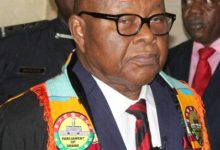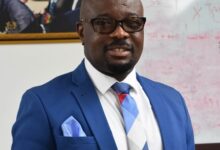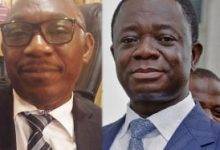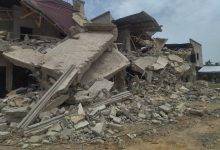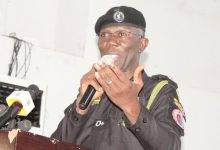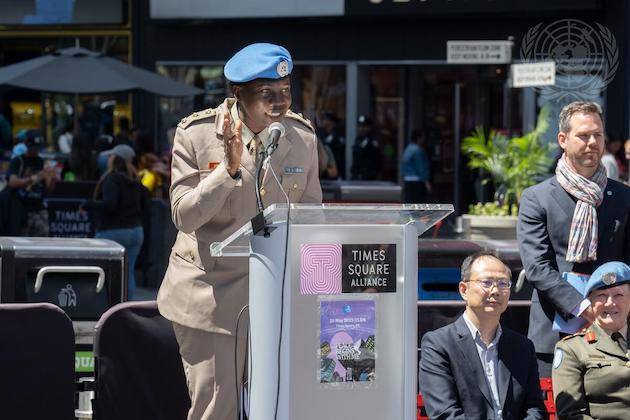
Cecilia Erzuah was torn between two opposite career paths at the end of university.
The week she was supposed to begin military training, her professor offered her a position as a lecturer.
Erzuah had worked as a teacher before and thought she was pretty good at it. She had also been in Ghanaian youth cadet programmes throughout school. But she had never seen the military as a viable career before.
“I’m going into the military,” Erzuah decided. She remembers telling her professor she could still lecture, even while serving. In a way, she did.
Years later, Erzuah would host discussions on domestic violence and gender equality as the commander of a Ghanaian engagement platoon with the UN Interim Security Force for Abyei.
She was awarded the United Nations’ 2023 Military Gender Advocate of the Year award for her service. The UN Police Division aims to increase the number of women serving in military contingents to 15 per cent by 2028 from the 10 per cent it last reported in 2016.
While Ghana is the largest contributor of women military peacekeepers, Erzuah was the first to receive the award, the UN reports. Abyei is a contested area between Sudan and South Sudan.
Recently, violence in Sudan has “worsened dramatically,” the former UN special envoy for Sudan, Volker Perthes, said. Perthes resigned last week, warning that the “conflict between Sudan’s rival military leaders’ could be morphing into a full-scale civil war,” AP reported.
According to UN humanitarian representative Edem Worsornu, millions of Sudanese people are at risk of famine. Cases of sexual violence have been driven to “distressing levels.”
Erzuah’s experiences working with local communities in the region are a reminder of the everyday people still relying on support. When villages are attacked, “you see nursing mothers (and) parents carrying their children with one hand trying to salvage the few clothing they have and running for their lives,” she says.
Peacekeepers help these internally displaced people get to safety. “The most valuable thing we have in life is our life, and then the peace we enjoy- because how much can you carry with you when you’re running for your life?” Erzuah asked.
In Abyei, Erzuah was charged with maintaining engagement with local leaders and organizations as a liaison between her battalion and the community.
“If you don’t engage the community as a peacekeeper, you will be doing things they do not need,” Erzuah says.
“You will exert your energy for nothing.” Local people also share critical knowledge. For instance, they can help UN personnel predict when and where attacks will occur. But it wasn’t easy to get community members to open up.
Many women are wary of men – who they have seen perpetuate the crimes around them, Erzuah explains. Over time, though, Erzuah’s platoon, which consisted of an equal number of men and women, gained the trust of the people they were meant to serve.
They had a particular impact on women who were encouraged by the presence of other women in a typically male-dominated field.
“When the woman smiles, you feel it is more genuine than the man,” Erzuah jokes. More women have joined community protection committees thanks to the platoon’s outreach efforts.
“On every front, Captain Erzuah’s work has set the standard for ensuring that the needs and concerns of women are reflected across our peacekeeping operations,” Secretary-General Antonio Guterres said at her award ceremony.
“The mixed patrols are…boosting the confidence of community members to go about daily activities safely,” Deng Paul Mankuol, a traditional chief in Majbong, said.
Erzuah smiles when she remembers learning about her physiology alongside local women during a breast cancer awareness event last year. “You realise that we are different but the same.” Still, it’s not easy to be a woman in the military.
All peacekeepers must adapt to unfamiliar environments and remain constantly on alert. Erzuah points out that women must also adapt to being on long patrols in areas without infrastructure to support their unique needs, like access to menstruation products.
Ultimately, Erzuah chose her path because she’s never been afraid of a challenge. Growing up, Erzuah aspired to accomplish something that would demand her to be extraordinary.
She relishes her current opportunity to show that women can be equally capable: “You feel you’re having the most impact when you will even see admiration in people’s faces.”
When people ask her if she’s afraid, Erzuah says they just want to know what motivates her. She sees the questions as a chance to explain that she struggled to get where she is now but that if she did it, they can, too.
Erzuah designs almost everything she wears – besides her uniform in her free time. She may still just be an “amateur fashion designer,” but she thinks that if she ever wants to be a professional, she can.
It’s her belief that a person can be outstanding in any field they set their mind to. IPS UN Bureau Report
BY ABIGAIL VAN NEELY

